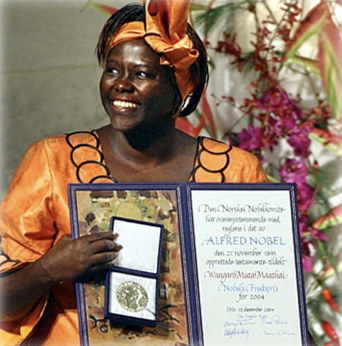Wangari Maathai: Heroine of Peace, Social Justice, and Ecology
“Trees are living symbols of peace and hope. A tree has roots in the soil yet reaches to the sky. It tells us that in order to aspire we need to be grounded...”
During Laudato Si' Week 2024 “Seeds of Hope,” dedicated to promoting peace, social justice, and sustainable ecology, we honor Wangari Maathai, brave activist and founder of the Green Belt Movement. Her tireless struggle for a more just and equitable world, as well as her courage in facing gender discrimination, make her a true example of inspiration for new generations.
Environmental and Social Pioneer
Wangari Maathai, born on April 1, 1940, in Nyeri, Kenya, was a woman who defied stereotypes and made her way in a male-dominated world. Despite the difficulties and criticisms she received, she never gave up and became a powerful voice in the fight for the environment and the rights of the most vulnerable women and children.
“In a few decades, the relationship between the environment, resources and conflict may seem almost as obvious as the connection we see today between human rights, democracy and peace”.
In 1977, Maathai founded the Green Belt Movement, a pioneering initiative that promoted tree planting to combat deforestation and improve living conditions in rural communities. Through this movement, more than 40 million trees were planted across Africa, which had a significant impact on environmental conservation and people’s quality of life.
It's the little things citizens do. That's what will make the difference. My little thing is planting trees.
Education for Women and Empowerment
Maathai was the first woman in East Africa to receive a doctorate, and through her work, she promoted education and the empowerment of women. With the Green Belt Movement, she not only educated women in rural villages but also paid them for each tree they planted, helping to plant millions of trees and bringing income to the villages.
It was not easy for Maathai. In a society that underestimated and belittled women, she constantly faced obstacles and discrimination. Many criticized and challenged her because of her gender, trying to relegate her to traditional gender roles, such as household chores. But with courage and determination, Maathai stood firm in her struggle and proved that women have a fundamental role in building a more just and sustainable future.
“If we can send man to the moon, why can we not plant a tree? African women in general need to know that it's OK for them to be the way they are - to see the way they are as a strength, and to be liberated from fear and from silence”.
Struggle and Recognition
Wangari Maathai risked her life on several occasions, being beaten and arrested by Kenyan authorities due to her activism. However, her courage and dedication were recognized worldwide when in 2004 she became the first African woman to receive the Nobel Peace Prize for her contribution to sustainable development, democracy, and peace.
“We need to promote development that does not destroy our environment”.
Inspiration for New Generations
Wangari Maathai passed away on September 25, 2011, after a battle with ovarian cancer. Her legacy endures in the millions of trees planted, the green spaces saved, and the lives of the women and communities she helped. Her legacy continues to inspire new generations to follow in her footsteps and fight for a better world. Her story is a reminder that gender should not be an obstacle to success and personal fulfillment. Her courage and determination teach us that we can all make a difference, no matter the adversities we face.
“When we plant trees, we plant the seeds of peace and seeds of hope.
We also secure the future for our children”.
References
Green Belt Movement
https://www.goodreads.com/author/quotes
Wangari Maathai, Nobel Women’s Initiative
Wangari Maathai, 1325 Mujeres Tejiendo la Paz

